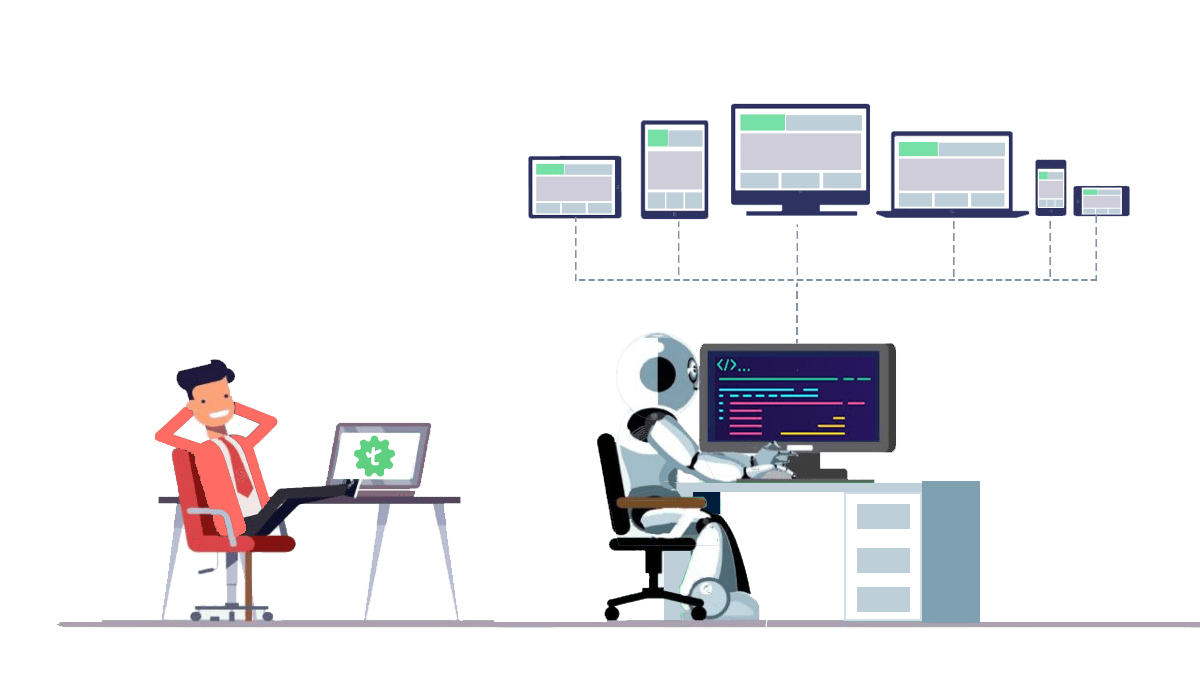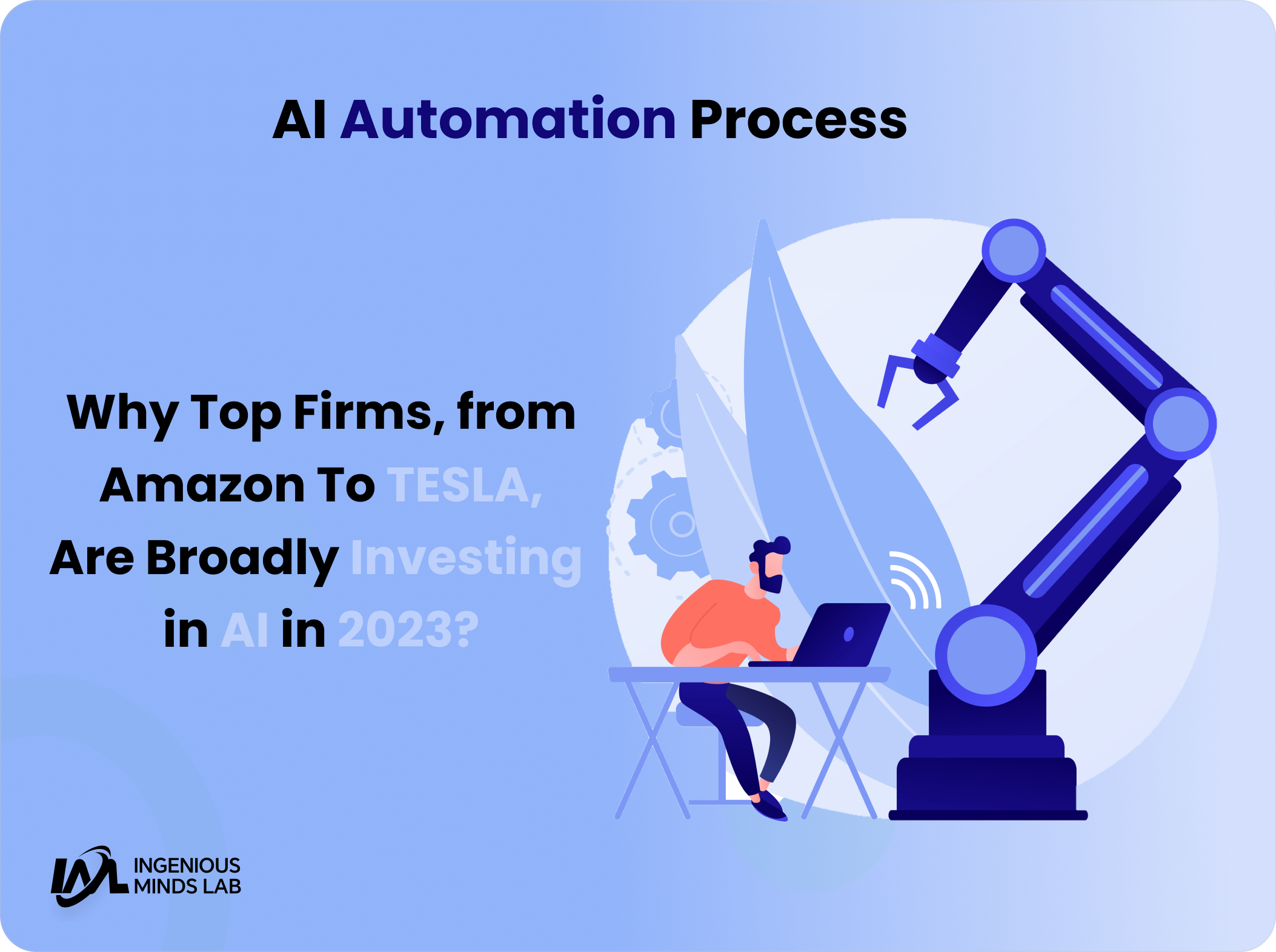In today’s competitive business landscape, survival has become a challenging task. New businesses are constantly emerging, employing innovative strategies to gain an edge. As market competition intensifies, companies are in dire need of a reliable and efficient solution to streamline their essential operations. This is where Artificial Intelligence (AI) steps in to save the day. We have question Why Top Firms, From Amazon to Tesla, Are Broadly Investing in AI Process Automation?
When we think of AI and intelligent process automation, we might initially envision the futuristic scenes from movies like Iron Man, where Tony Stark interacts with his AI assistant, J.A.R.V.I.S., for various tasks. However, the reality of AI-powered robotic process automation portrayed in those films is still a few years away. Nevertheless, AI has gradually evolved into a mainstream technology, particularly in automating critical business processes, across multiple industries.
Take a look at the following AI market predictions to gain more confidence:
- According to a survey by Gartner, approximately 20% of business leaders express strong interest in investing in AI automation, which is emerging as a prominent trend in industries like invoicing and contract validation.
- A study conducted by Forbes reveals that around 40% of Sales and Marketing departments in various industries are showing keen interest in AI investments.
- In a survey conducted by O’Reilly, 48% of respondents indicated that businesses are extensively utilizing AI, machine learning (ML), and data analytics for data quality checking.
- Research by Semrush suggests that by 2027, approximately 80% of business executives expect the retail industry to invest in AI-powered intelligent automation.
The current industrial automation market is witnessing significant growth in AI integration, leading one survey to predict that the industrial AI automation market will reach $289 billion by 2028.
So, why is AI automation gaining popularity across global industries? This blog aims to shed light on the importance of AI process automation for businesses.
What is AI-Powered Automation?: Streamlining Efficiency with AI Process Automation
AI-Powered Automation, also known as AI Process Automation, revolutionizes the way businesses streamline their operations. It combines the power of artificial intelligence (AI) with automation, paving the way for enhanced efficiency, accuracy, and productivity.
AI Process Automation harnesses AI technologies to automate various tasks and processes. By leveraging machine learning algorithms, AI systems can learn from data inputs, identify patterns, and make intelligent decisions. This eliminates the need for extensive human intervention, resulting in faster and more precise execution of tasks.
One of the key advantages of AI Process Automation is its ability to handle vast amounts of data. Through machine learning, AI systems can process and analyze data, enabling them to adapt and respond to complex scenarios. This adaptability makes them valuable in diverse industries, including customer service, manufacturing, healthcare, finance, and transportation.
In customer service, AI-powered chatbots, equipped with natural language processing (NLP) capabilities, can instantly provide support and handle routine inquiries. This frees up human agents to focus on more complex customer issues, improving overall service quality.
In manufacturing, AI-powered robots armed with computer vision and machine learning can automate repetitive assembly line tasks. These robots work tirelessly, ensuring precision and consistency, while human workers can concentrate on more critical aspects of production.
AI Process Automation offers numerous benefits, including increased productivity, reduced errors, and improved decision-making. By automating routine and mundane tasks, organizations can allocate their resources more effectively and allocate valuable time to strategic initiatives.
While AI Process Automation offers significant advantages, it is crucial to consider potential challenges. Implementation requires careful planning, data quality, and employee training. Organizations must also ensure transparency, ethics, and compliance when deploying AI systems.

Businesses today are utilizing AI Process Automation in a variety of ways to optimize operations, enhance customer experiences, and drive innovation. AI Process Automation combines the power of artificial intelligence (AI) with automation, streamlining efficiency across various industries.
- Customer Service: AI Process Automation is utilized in customer service through AI-powered chatbots and virtual assistants. They provide instant support, handle inquiries, and automate routine tasks, improving response times and customer satisfaction.
- Data Analysis: AI Process Automation enables businesses to process and analyze large volumes of data efficiently. Machine learning algorithms extract valuable insights and patterns, empowering data-driven decision-making and strategy optimization.
- Predictive Maintenance: AI algorithms monitor equipment and systems in real-time, detecting anomalies and predicting maintenance needs. This proactive approach reduces downtime, optimizes maintenance schedules, and prevents costly breakdowns.
- Supply Chain Optimization: AI Process Automation analyzes data related to inventory, demand patterns, and logistics. This aids in accurate demand forecasting, streamlined inventory management, and optimized delivery routes, leading to cost reduction and improved efficiency.
- Content Generation: AI-powered tools, leveraging AI Process Automation, automatically generate content like reports, articles, and summaries. By analyzing data and applying natural language processing techniques, businesses can create content at scale, saving time and resources.
- Recruitment and HR: AI Process Automation supports talent acquisition and HR processes. It automates resume screening, candidate sourcing, and employee engagement analysis, streamlining recruitment procedures and enhancing workforce management.
- Healthcare Diagnosis: AI algorithms, as part of AI Process Automation, aid medical professionals in diagnosing diseases. By analyzing medical imaging data, identifying patterns, and recommending treatment options, AI enhances diagnostic accuracy and efficiency.
- Finance and Fraud Detection: AI Process Automation is applied in finance for tasks like fraud detection. AI algorithms analyze patterns and anomalies in financial transactions, enabling real-time fraud detection and enhanced security measures.
- Autonomous Vehicles: AI Process Automation plays a vital role in self-driving cars. By leveraging AI, autonomous vehicles can perceive and respond to their surroundings, navigate roads, and make real-time decisions, ensuring safe and efficient transportation.
- Innovation and Efficiency: Overall, AI Process Automation drives innovation and enhances operational efficiency across industries. It empowers businesses to leverage data, automate tasks, and make informed decisions, unlocking new opportunities and maintaining competitiveness.
In conclusion, AI Process Automation finds application in customer service, data analysis, predictive maintenance, supply chain optimization, content generation, recruitment and HR, healthcare diagnosis, finance, fraud detection, autonomous vehicles, and overall business innovation and efficiency. It streamlines operations, improves decision-making, and transforms industries in the digital age.
Benefits of Implementing AI-Powered Process Automation for Your Business
- Increased Efficiency: AI-powered process automation can streamline and optimize repetitive tasks, reducing manual effort and increasing overall efficiency. By automating time-consuming and mundane processes, businesses can reallocate resources to more value-added activities, resulting in improved productivity.
- Improved Accuracy: AI algorithms can process and analyze large volumes of data with precision, minimizing the risk of human errors. This accuracy is particularly valuable in areas such as data analysis, quality control, and decision-making, where even minor mistakes can have significant consequences.
- Cost Savings: Automation of processes through AI-powered systems can lead to substantial cost savings. By reducing the need for manual labor, businesses can lower operational expenses, minimize the potential for human error-related costs, and optimize resource allocation.
- Enhanced Customer Experience: AI-powered automation can significantly improve the customer experience by providing quick and personalized support. Chatbots and virtual assistants powered by AI can handle customer inquiries 24/7, offering instant responses and tailored recommendations, leading to increased customer satisfaction and loyalty.
- Scalability: AI-powered process automation provides businesses with the ability to scale their operations without proportionally increasing human resources. As the volume of work increases, AI systems can handle higher workloads, ensuring consistent performance and eliminating bottlenecks.
- Data-Driven Decision Making: AI algorithms can analyze vast amounts of data and provide actionable insights to support decision-making processes. By leveraging AI-powered automation, businesses can make informed decisions based on real-time data, leading to improved strategies and outcomes.
- Risk Mitigation: AI-powered process automation can help identify and mitigate risks in various areas, such as fraud detection, compliance monitoring, and cybersecurity. By continuously monitoring and analyzing data, AI systems can detect anomalies and potential threats, allowing businesses to take proactive measures to mitigate risks.
- Innovation and Competitive Advantage: Embracing AI-powered process automation enables businesses to stay at the forefront of technological advancements and innovation. By leveraging AI capabilities, businesses can differentiate themselves from competitors, introduce new products or services, and adapt to changing market demands more efficiently.
- Time Savings: Automating processes through AI-powered systems can significantly reduce the time required to complete tasks. This allows businesses to operate more efficiently, meet deadlines, and respond quickly to customer needs, ultimately improving overall agility and competitiveness.
- Continuous Learning and Adaptability: AI-powered systems have the ability to learn and adapt over time. By analyzing data and user interactions, these systems can continuously improve their performance, adapt to changing conditions, and provide increasingly accurate and valuable insights.
In conclusion, implementing AI-powered process automation can bring numerous benefits to businesses, including increased efficiency, improved accuracy, cost savings, enhanced customer experience, scalability, data-driven decision-making, risk mitigation, innovation, time savings, and continuous learning. By embracing AI-powered automation, businesses can optimize their operations, gain a competitive edge, and thrive in the digital era.
5 Key Considerations For AI Process Automation
When implementing AI process automation in your business, there are several key considerations to keep in mind. Here are five important factors to consider:
- Define Clear Objectives: Before implementing AI process automation, clearly define your objectives and the specific processes you aim to automate. Identify the pain points, bottlenecks, or repetitive tasks that would benefit from automation. Having a clear understanding of your goals will help guide the implementation process and ensure that AI is applied in the most effective and targeted manner.Data Quality and Availability: AI relies on quality data for accurate analysis and decision-making. Ensure that you have access to relevant, reliable, and properly labeled data to train the AI algorithms. Assess the quality and completeness of your data and consider implementing data management processes to maintain data integrity. Additionally, consider data privacy and compliance requirements to ensure that sensitive data is handled appropriately.
- Ethical and Transparent AI: AI process automation should adhere to ethical standards and promote transparency. Evaluate the potential ethical implications of automation and establish guidelines for responsible AI use. Consider fairness, bias, and discrimination issues to ensure that the automation system treats all individuals fairly and impartially. Transparently communicate the presence and role of AI systems to customers and stakeholders to build trust and maintain transparency.
- Change Management and Workforce Impact: Implementing AI process automation may require changes in roles, responsibilities, and workflows within your organization. Proactively address any concerns or resistance from employees and involve them in the process to ensure a smooth transition. Provide training and upskilling opportunities to help employees adapt to the new automated processes and focus on more strategic tasks. Consider the potential impact on the workforce and plan for a smooth integration of automation with human skills.
- Continuous Monitoring and Improvement: AI process automation is not a one-time implementation but a continuous journey. Establish mechanisms to monitor and evaluate the performance of the AI systems over time. Regularly assess the accuracy, efficiency, and impact of the automation to identify areas for improvement. Implement feedback loops to gather insights from employees and users to refine the automation process and make necessary adjustments. Continuously update and enhance the AI algorithms to ensure they remain effective and aligned with changing business needs.
By considering these key factors, you can effectively implement AI process automation in your business while addressing potential challenges and maximizing the benefits of automation.
How Can Ingenious Minds Lab Help Your Business With AI Automation?
Ingenious Minds Lab can provide valuable assistance to your business in leveraging AI automation to drive innovation, improve efficiency, and achieve your business objectives. Here’s how Ingenious Minds Lab can help:
- Expertise in AI and Automation: Ingenious Minds Lab comprises a team of AI experts who have in-depth knowledge and experience in developing and implementing AI automation solutions. They stay up-to-date with the latest advancements in AI technologies and can guide you in leveraging the most suitable AI tools and techniques for your specific business needs.
- Customized AI Automation Solutions: Ingenious Minds Lab can work closely with your business to understand your unique requirements and design customized AI automation solutions tailored to your specific processes and objectives. They will collaborate with you to identify areas where automation can bring the most significant benefits and develop AI-powered systems to streamline those processes.
- Data Analysis and Modeling: AI automation heavily relies on data analysis and modeling. Ingenious Minds Lab can assist in analyzing your data, identifying patterns, and building robust AI models that can effectively automate tasks and make accurate predictions. They have the expertise to handle large datasets, perform data preprocessing, and select the most suitable machine learning algorithms for your specific use cases.
- Integration and Deployment: Ingenious Minds Lab can support you in integrating AI automation solutions seamlessly into your existing infrastructure. They can help you navigate the technical complexities, ensuring smooth deployment and integration with minimal disruption to your operations. They will provide guidance on data integration, system compatibility, and scalability to ensure that the automation solution aligns with your business goals.
- Continuous Support and Optimization: AI automation is an ongoing process that requires continuous monitoring, optimization, and maintenance. Ingenious Minds Lab can provide ongoing support, ensuring that the implemented automation solution performs optimally and adapts to evolving business needs. They can help fine-tune the AI models, incorporate feedback, and make necessary adjustments to ensure sustained efficiency and effectiveness.
- Ethical and Responsible AI Practices: Ingenious Minds Lab places a strong emphasis on ethical and responsible AI practices. They can guide your business in ensuring fairness, transparency, and compliance with ethical standards in AI automation. They will work with you to address any ethical concerns, minimize bias, and promote transparency in the deployment and use of AI automation systems.
Overall, Ingenious Minds Lab can be a trusted partner in your AI automation journey. They bring expertise, customization, and ongoing support to help your business harness the power of AI, maximize the benefits of automation, and stay ahead in today’s competitive landscape.
- FAQs on AI-Powered Process Automation
What is AI-powered process automation?
AI-powered process automation combines AI technologies with automation to streamline and optimize business processes. It involves using AI algorithms and machine learning techniques to automate repetitive tasks, analyze data, make predictions, and improve decision-making.3 - What are the benefits of AI-powered process automation?
The benefits of AI-powered process automation include increased efficiency, improved accuracy, cost savings, enhanced customer experience, scalability, data-driven decision making, risk mitigation, innovation, time savings, and continuous learning. - What types of processes can be automated with AI?
AI-powered process automation can be applied to various processes across industries, including customer service, data analysis, predictive maintenance, supply chain management, content generation, recruitment and HR, healthcare diagnosis, finance, fraud detection, and more. - Do businesses need a large amount of data to implement AI process automation?
While having access to quality data is important for AI process automation, the required amount of data varies depending on the specific application. Some AI algorithms can work with smaller datasets, while others may require larger volumes of data for training and accurate analysis. - How long does it take to implement AI process automation in a business?
The timeline for implementing AI process automation varies depending on the complexity of the processes involved, the availability and quality of data, the required AI models and algorithms, and the level of customization needed. It can range from a few weeks to several months. - Can AI process automation replace human workers?
AI process automation is designed to augment human capabilities and automate repetitive tasks, but it does not necessarily replace human workers. Instead, it frees up human resources to focus on more complex and strategic tasks that require creativity, critical thinking, and human interaction. - How can businesses ensure ethical and responsible AI process automation?
To ensure ethical and responsible AI process automation, businesses should establish guidelines and policies for AI use, consider fairness and bias issues, promote transparency in AI systems, and regularly evaluate and monitor the impact of automation on individuals and society. Compliance with relevant regulations and ethical standards is crucial. - Can AI process automation be implemented in small businesses?
Yes, AI process automation can be implemented in businesses of all sizes, including small businesses. There are AI automation tools and platforms available that are scalable and accessible to businesses with varying budgets and resources. - Will AI process automation eliminate jobs?
While AI process automation may change the nature of certain job roles, it does not necessarily lead to widespread job elimination. Instead, it often shifts the focus of human workers to more value-added tasks and opens up new opportunities in managing and leveraging AI systems. - How can businesses get started with AI process automation?
To get started with AI process automation, businesses should identify their automation needs, assess the availability and quality of their data, explore AI technologies and tools, consider working with AI experts or consultancies, and pilot small-scale automation projects to test and refine the implementation.
Also Read this -> Flutter vs. iOS: Why Flutter Takes the Crown for iOS Development in 2023

